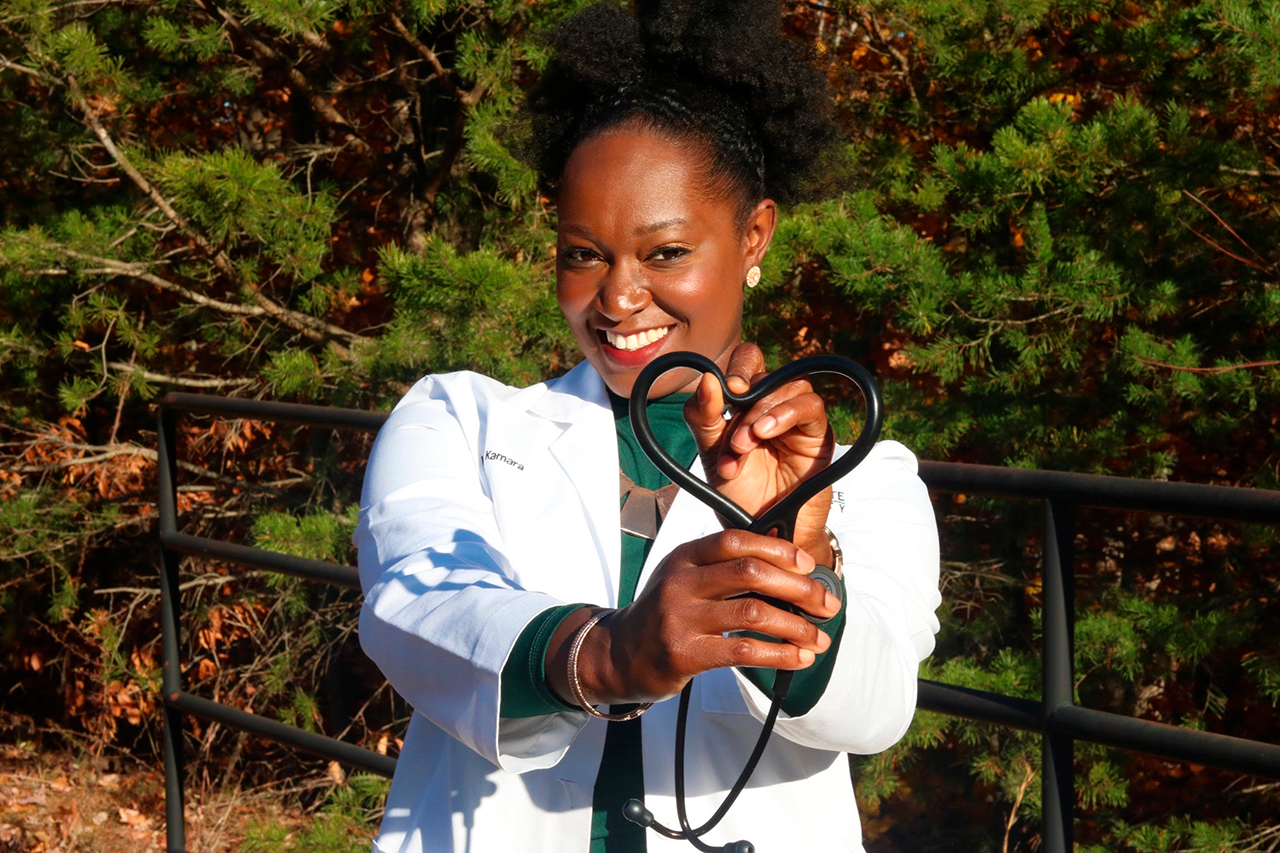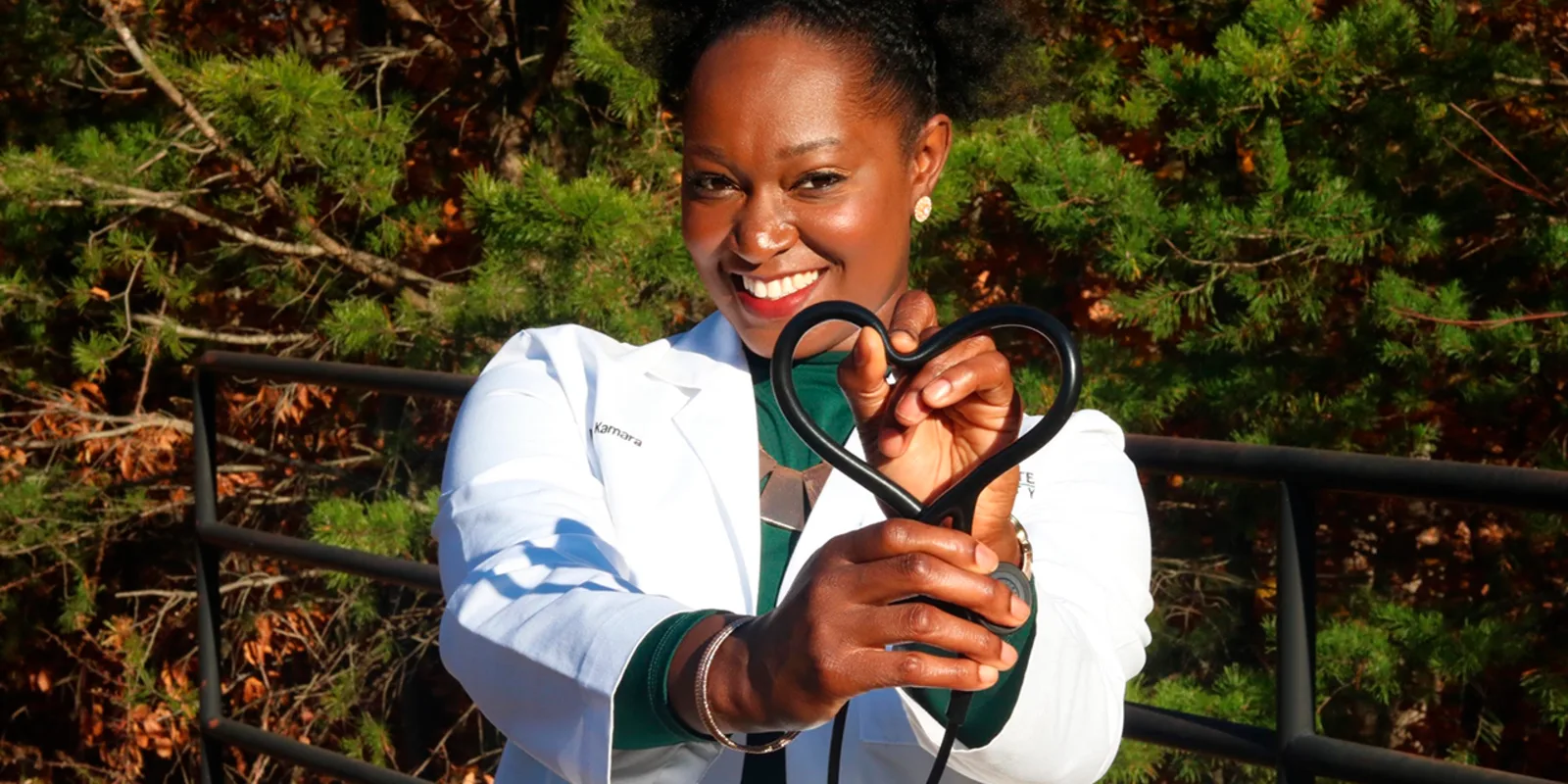
Name: Maseray Kamara
Medical School: Michigan State University College of Human Medicine
Year: Fourth Year
1. What is your #1 study tip?
Minimize distractions. When you’re on, you’re on. No social media. No texting. No phone calls. But, when your taking a break from studying, do it to the fullest. Laugh ferociously and do the things that you enjoy most!
2. How do you keep yourself motivated or get out of study ruts?
I watch motivational speeches on youtube; some of my favorites are by Oprah Winfrey, Eric Thomas, and Denzel Washington. Hearing about someone else’s persistence and determination has a way of positively feeding my inner drive.
3. What does your daily study routine and schedule look like?
The key is balancing excelling clinically (working with your team, getting to know your patients, etc.) and excelling academically (completing assignments, preparing for the shelf exam). When I’m at my best, I study for an hour before heading to the hospital, focus on clinical duties when I arrive, and identify breaks throughout the day to squeeze in quick study sessions. The evening is when the bulk of my studying occurs.
4. What would your classmates be most surprised to learn about you?
That I want to write a book and be a New York Times Bestselling Author.
5. How did you decide what specialty to pursue?
I treated my 3rd year clerkships like a speed dating course. While I had particular interests, I kept an open mind: would I like waking up to this specialty every day? Did I find certain patient interactions emotional draining or energizing? Is this true, sustainable love, or is it more of a summer fling? Date each specialty seriously and your interests will quickly narrow down.
6. What book/podcast/blog/vlog would you recommend to all medical students?
Find a podcast that brings you joy. I enjoy listening to a comedy podcast on my way to the hospital. Starting my day off belly-aching laughing, puts me in a great mood.
7. What would you be doing if you weren’t in medical school?
Between undergrad and medical school, I started an SAT prep business called Foundation Preparation. Unfortunately, I had to close shop with the demands of medical school. If I wasn’t in school, I would be building a nationally renowned SAT preparation company. I find teaching others and being a small part of their success journey to be very fulfilling.
8. What is the most important lesson you’ve learned so far in medical school?
Failure and pain are temporary. Whether it’s incorrectly answering a question on rounds or stressing over a lower than expected score on an exam, these trials and tribulations come and go. You must stay focused on the end goal. Don’t let small losses overshadow your big win: you are a doctor in the making!
9. What is your curriculum like at Michigan State?
MSU College of Human Medicine is a community based med school with two pre-clinical campuses, East Lansing and Grand Rapids, and 7 clinical campuses. I did my preclinical training in East Lansing and am completing my clinical training on the Flint campus. I trained under the Legacy Curriculum where the first year was lecture based, the second was systems/problem based learning, and the third and fourth year are required and elective clerkships. We now have a new curriculum called the Shared Discovery Curriculum where medical students begin clinical rotations during their first year.
10. How are the topics of burnout, wellness, and work-life balance addressed at your school?
During our 1st and 2nd year, we are assigned to a small mentor group of 6 students and one faculty member. Once every few months, we would meet for dinner or a fun activity to discuss the impact of medical education on our individual lives. It was always great to decompress and hear that my classmates were having similar questions and going through similar struggles. During our 3rd year, we have a similar support system called the Virtuous Physician group.
11. How can medical students better support each other inside and outside of the classroom?
Go to medical school intent on building a family and support system composed of other students, residents, fellows, and attendings. You can’t and shouldn’t do this journey alone. Develop robust relationships that transcend academics, and you will find a medical family that truly cares about your life, dreams, and aspirations.
12. What is the best advice a resident/attending gave you?
My Internal Medicine attending urged me not to have rigid thinking when it comes to reading EKGs and life in general. He said accept the nuisances in medicine and appreciate individuality.
13. Do you have any tips on being on-call?
Most people dread being on call, BUT for students, call equates to the best learning experiences. Take advantage of the time after business hours, accept more responsibility, practice autonomy, and respectfully bombard your residents with question when there is a lull in activity.
14. What patient will you never forget?
I was on the Medicine service and my patient had extensive rhabdomyolysis that led to electrolyte disturbances. I watched him go from alert and oriented x 3 to hallucinating that his college best friend was sitting at the edge of his bed. This was the first patient I helped care for who died, and I will never forget him.
15. What has been your most gratifying moment of medical school?
As a medical student on the Flint campus, it was an honor to serve as the Issue Editor for the AMA Journal of Ethics ‘Clean Water Access and Role of Clinicians’ issue. It allowed me to merge my clinical experiences during the Flint water crisis and my interests in public health and medical journalism.
16. As someone who has interacted with writing for magazines and appearing on radio stations, what advice do you have for medical professionals who may not be used to having a high public profile but are interested in cultivating one?
I remember preparing for my debut radio taping. I was nervous and attempting to “study” for potential questions that I might be asked. But then it hit me: speak what you know. My advice is to write and speak from your own personal experiences. Don’t try to create an image. Your authentic perspective will resonate with varying audiences for varying reasons and that’s how you can positively impact others. Please follow me on Instagram @maserayskamara to learn more about my journey!






